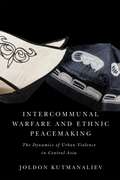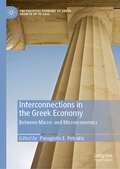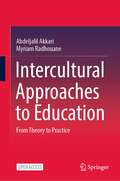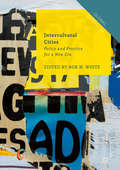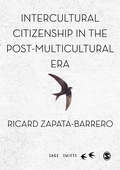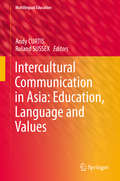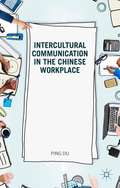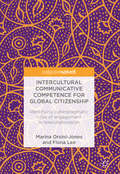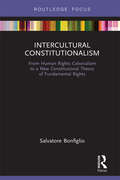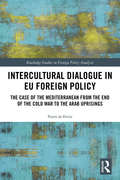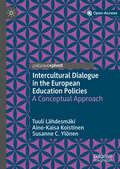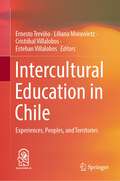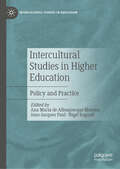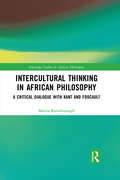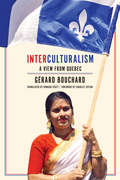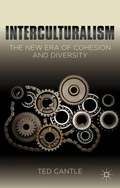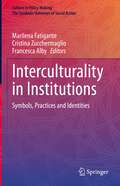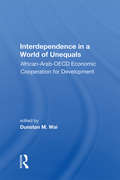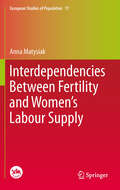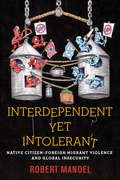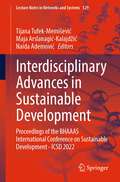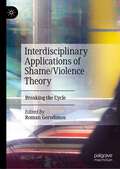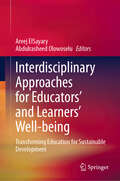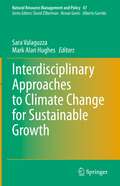- Table View
- List View
Intercommunal Warfare and Ethnic Peacemaking: The Dynamics of Urban Violence in Central Asia (McGill-Queen's Studies in Protest, Power, and Resistance)
by Joldon KutmanalievWith increasing urban population density, conflicts in cities erupt more frequently and violently. Cities have become hotspots for armed combat, highlighting the urgency of understanding the impact of local communities and urban factors on the development of violent conflict. Joldon Kutmanaliev presents a novel approach to analyzing communal violence and armed conflicts in urban zones. Drawing from fieldwork in cities of southern Kyrgyzstan, he explains local-level variations in violence across neighbourhoods during the most intense and violent episode of urban communal violence in Central Asia – the clashes between Kyrgyz and Uzbeks in June 2010. Kutmanaliev explains why armed violence affects some urban neighbourhoods but not others, why local communities react differently to the same existential threat, how they deal with a deteriorating security environment and interethnic fears, and how different types of urban planning and urban landscapes influence the spread of violence. Importantly, the book identifies key factors that help local communities and their leaders to negotiate non-aggression pacts and control local constituencies, and therefore successfully prevent violence.Intercommunal Warfare and Ethnic Peacemaking explains communal war and ethnic peacemaking on the level of neighbourhood communities – a perspective that is largely absent in previous studies.
Interconnections in the Greek Economy: Between Macro- and Microeconomics (The Political Economy of Greek Growth up to 2030)
by Panagiotis E. PetrakisThis book examines the economic interconnections of the Greek economy at a macro and micro level, allowing it to explore both the economic relations between the various sectors and the interconnections of various companies and overlaps in management boards. Two approaches are used to quantify interdisciplinary and cross-sectoral interfaces: the traditional input-output analysis approach and the “influence and information flow” approach through network analysis. The book's first part presents the current conditions and the economic interconnections within the Greek economy. In the second part, during the analysis of microeconomic interconnections between individuals and companies, a much more thorough presentation of the economic interconnections of Greek companies is established. Finally, the book’s third part presents how the Greek economy must transform its production prototype under structural constraints and opportunities for economic diversification and inclusive growth and under the pressure of economic shocks and uncertainty.
Intercultural Approaches to Education: From Theory to Practice
by Abdeljalil Akkari Myriam RadhouaneThis open access book provides an analysis of contemporary societies and schools shaped by cultural diversity, globalization and migration. This diversity is necessarily reflected in education systems and requires the promotion of intercultural approaches able to improve learning processes and the quality of education. From an international and comparative perspective, this book first presents theoretical and conceptual foundations for seriously considering cultural diversity. The book also compares intercultural approaches and debates generated in countries as diverse as the United States, Canada, Brazil, Switzerland and France. For each national context, the book addresses both the historical roots of intercultural approaches and the concrete initiatives driven by educational policies for their implementation in schools and classrooms. Finally, the book presents discussions surrounding the treatment of linguistic or religious diversity in schools, the emergence of global citizenship education and the key role of teachers in intercultural approaches.This is an open access book.
Intercultural Cities
by Bob W. WhiteThis book sets out to explore the political and social potential of intercultural policy for cities by bringing together advances in the areas of urban planning and intercultural theory. In recent years, demographic changes in cities in many parts of the world have led to increasing concerns about inter-ethnic tensions, social inequality, and racial discrimination. By virtue of their intermediate status, cities are in a particularly good position to design policy and programs that contribute to the well-being of all citizens, regardless of their origins. Certain cities have made significant advances in this domain, but until now very little work has been done to understand the specificity of work in the area of intercultural policy frameworks. The overall goal of this volume is to facilitate conversations between researchers and practitioners in their efforts to make cities more inclusive. This volume is the result of a series of on-going collaborations between academics and practitioners and it includes a number of original case studies that explain the evolution of intercultural policy from the point of view local actors. This collection will be of interest especially to policymakers and urban planners, but also to scholars and students in the areas of urban studies, public policy, anthropology, sociology, globalization and social sciences more generally. By leveraging recent advances in the field of intercultural policy and practice, this volume sheds light on the conditions and strategies that make intercultural cities a part of a common future.
Intercultural Citizenship in the Post-Multicultural Era (SAGE Swifts)
by Ricard Zapata-BarreroThis book explores the intercultural policy paradigm emerging within diversity and migration studies. Drawing on empirical studies of cultural diversity and placing a focus on the current crises of identity in Europe, Zapata-Barrero argues for an intercultural model of citizenship that prioritises contact between diverse people. In looking forward to a post-multicultural era, his analysis suggests how we can better manage the challenges presented by our increasingly complex, multifaceted societies. This thoughtful text will appeal to students and scholars across politics, sociology, anthropology and social psychology, as well as policy makers and social entrepreneurs around the world grappling with issues around migration, diversity and citizenship. Ricard Zapata-Barrero is a Professor of Political and Social Sciences at the Universitat Pompeu Fabra. He is also Director of the Interdisciplinary Research Group on Immigration at UPF, on the Board of Directors for IMISCOE, an expert on the Intercultural Cities Program, and founded the Intercultural Cities Network in Spain in 2014. Additionally, he is a Compendium expert within the Council of Europe.
Intercultural Citizenship in the Post-Multicultural Era (SAGE Swifts)
by Ricard Zapata-BarreroThis book explores the intercultural policy paradigm emerging within diversity and migration studies. Drawing on empirical studies of cultural diversity and placing a focus on the current crises of identity in Europe, Zapata-Barrero argues for an intercultural model of citizenship that prioritises contact between diverse people. In looking forward to a post-multicultural era, his analysis suggests how we can better manage the challenges presented by our increasingly complex, multifaceted societies. This thoughtful text will appeal to students and scholars across politics, sociology, anthropology and social psychology, as well as policy makers and social entrepreneurs around the world grappling with issues around migration, diversity and citizenship. Ricard Zapata-Barrero is a Full Professor of Political and Social Sciences at the Universitat Pompeu Fabra (Barcelona, Catalonia, Spain). He is also Director of the Interdisciplinary Research Group on Immigration at UPF, and Master in Migration Studies. He is member of the Board of Directors for IMISCOE and Chair of the External Affairs Committee. For information about publications, go to his webpage: www.upf.edu/web/ricard-zapata
Intercultural Communication in Asia: Education, Language and Values (Multilingual Education #24)
by Roland Sussex Andy CurtisThis volume presents in-depth studies on leading themes in education policy and intercultural communication in contemporary Asia, covering empirical as well as theoretical approaches, and offering both an in-depth investigation of their implications, and a synthesis of areas where these topics cohere and point to advances in description, analysis and theory, policy and applications. The studies address key questions that are essential to the future of education in an Asia where intercultural communication is ever more important with the rise of the ASEAN Economic Community and other international initiatives. These questions include the properties of the increasing globalisation of communication and how it plays out in Asia, especially but not exclusively with reference to English, and how we can place intercultural communication in this context, as well as studies that highlight intercultural communication and its underlying value systems and ideologies in Asia.
Intercultural Communication in the Chinese Workplace
by Ping DuChina's sharp economic growth at the beginning of the twenty-first century has resulted in an increasing number of people from the other countries moving to work in China. This inevitably highlights the cultural differences that are apparent between China and other global workplace cultures. This book proposes a new theoretical and methodological approach to the investigation and explanation of intercultural differences in conflict management strategies and relational (politeness) strategies in workplace settings, taking the Chinese workplace as its focus. Drawing upon social psychology, sociolinguistics and discourse analysis, the book analyses various types of data such as recordings of meetings, participant interviews, organizational documents and emails to offer a new research approach that has relevance for researchers and scholars of intercultural communication globally.
Intercultural Communicative Competence for Global Citizenship
by Marina Orsini-Jones Fiona LeeThis work builds on the assumption that language learning and teaching needs to be made more relevant to the 'glocalised' digital world we live in. Its authors argue that staff in Higher Education (HE) must prepare students for effective online interaction and explores the digital, linguistic and critical intercultural components of 'global citizenship'. The book pivots around an innovative research study; linguistic politeness frameworks are revisited to analyse the written online exchanges on an Online International Learning (OIL) - or intercultural telecollaborative - project between the UK and France. Through the use of cyberpragmatics, and inspired by Meyer and Land's 'threshold concept pedagogy', the authors examine the challenges and solutions identified by an 'expert student' in managing rules of engagement and intercultural awareness when interacting online. This book will appeal to students and scholars of applied linguistics, education, sociolinguistics and intercultural communication, and provide a valuable resource for teacher trainers, language teachers and educators across the world.
Intercultural Constitutionalism: From Human Rights Colonialism to a New Constitutional Theory of Fundamental Rights
by Salvatore BonfiglioThis book argues that the effective protection of fundamental rights in a contemporary, multicultural society requires not only tolerance and respect for others, but also an ethics of reciprocity and a pursuit of dialogue between different cultures of human rights. Nowadays, all cultures tend to claim an equitable arrangement that can be articulated in the terms of fundamental rights and in the multicultural organization of the State. Starting from the premise that every culture is and always was intercultural, this book elaborates a new, and more fundamentally, pluralist view of the relationship between rights and cultural identity. No culture is pure; from the perspective of an irreducible cultural contamination, this book argues, it is possible to formulate constitutional idea of diversity that is properly intercultural. This concept of intercultural constitutionalism is not, then, based on abstract principles, but nor is it bound to any particular cultural norm. Rather, intercultural constitutionalism allows the interpretation of rights, rules and legal principles, which are established in different contexts.
Intercultural Dialogue in EU Foreign Policy: The Case of the Mediterranean from the End of the Cold War to the Arab Uprisings (Routledge Studies in Foreign Policy Analysis)
by Pietro de PeriniThis book provides an original, rigorous and theoretically-grounded investigation into varying EU efforts to advance intercultural dialogue (ICD) in the framework of its foreign policy towards the Mediterranean during the period 1990-2014. From the end of the Cold War, the EU has increasingly invested in both rhetoric and resources on ICD promotion. In spite of this commitment, the EU has never offered a clear and permanent understanding of what this concept entails and has been actually aimed at. By adopting a FPA standpoint and approaching ICD as one of the foreign policy instruments developed by the EU to address the relations with its Mediterranean partners, this book exposes the causes and the modalities of the contradictory development of this relevant and long standing element of EU foreign policy. De Perini investigates change and continuity in the promotion of this tool, and provides in-depth knowledge of what ICD has actually meant for the EU: from the development and launch of the Euro-Mediterranean Partnership or Barcelona Process, to the revision of the European Neighbourhood Policy following the Arab uprisings. The book shows that the EU’s advancement of ICD in its foreign policy has gone through three distinct phases: ‘emergence’ (1990-2001), ‘consolidation’ (2001-2010) and ‘professionalisation’ (2010-2014). Empirically the book provides the first comprehensive and integrative analysis of all aspects of EU efforts to promote ICD. The book exposes a series of trends, limits and contradictions of EU foreign policy which are increasingly relevant today. In particular, it shows that over the last twenty-five years, the EU has addressed a set of persistent challenges characterising its relations with Mediterranean countries and people, namely challenges connected to regional conflicts, religious fundamentalisms, xenophobic attitudes towards Arab/Muslim migrants and related social tensions. As these challenges are still major issues in the current EU agenda and in the broader debate about EU foreign policy, this book provides rich and original empirical knowledge to an understanding of how the EU has decided to address these phenomena at different moments of its recent history.
Intercultural Dialogue in the European Education Policies: A Conceptual Approach
by Tuuli Lähdesmäki Aino-Kaisa Koistinen Susanne C. YlönenThis open access book analyses intercultural dialogue as a concept, policy and ideal in European education policy documentation. The core European transnational organizatons – the Council of Europe and the European Union – have actively promoted policies to engender inclusive societies and respond to challenges that diversification may entail. This book, in turn, offers suggestions for improving education policies in super-diversified Europe and beyond, where there is an increasing need for cultural understanding and constructive dialogue. The authors utilize concept analysis to reveal how these organizations seek to deal with dialogue between cultures, as well as weight given to cultural differences and intercultural encounters. This book will be of interest and value to scholars of intercultural dialogue and European education policies.
Intercultural Education in Chile: Experiences, Peoples, and Territories
by Ernesto Treviño Liliana Morawietz Cristóbal Villalobos Esteban VillalobosThis book examines the status of intercultural education in Chile. It does this through three axes: the first is multidisciplinary, including historical, anthropological, sociological, and pedagogical, to account for varied aspects of the Chilean intercultural education. The second is the consideration of multiple indigenous peoples, analyzing students’ groups or indigenous peoples, such as the Rapa Nui, Aymara, or Mapuche. Finally, the book has a multilevel perspective that recognizes that educational policy involves different actors, from the central government to local communities.The book incorporates study material enriched with the experience and analysis of different perspectives and methodologies of its authors, being useful for understanding intercultural education in the country. It is a versatile resource for understanding this topic, as well as a support for the development of programs and policies.Translation from the Spanish language edition: Educación Intercultural en Chile. Experiencias, pueblos y territorios by Ernesto Treviño, et al., © Ediciones UC 2017. Published by Ediciones UC. All Rights Reserved.
Intercultural Studies in Higher Education: Policy and Practice (Intercultural Studies in Education)
by Nigel Bagnall Ana Maria de Albuquerque Moreira Jean-Jacques PaulThis book explores the study of policies and practices in Higher Education by comparing systems, institutions, programs, innovations, results and cultures. In a rapidly changing global and international marketplace, the growth of higher education has occurred within distinct cultural contexts, meaning that change is reflected within local, regional, national and global perspectives. Using a single data methodology across countries and continents, the editors and contributors explore higher education reforms between global and local dimensions, the expansion of access and democratisation, and relevant aspects in the organisation and management of higher education. In doing so, this book arrives at an understanding of higher education at a truly intercultural level, which can lead to a deeper and more holistic understanding of policies and practices in higher education. This innovative book will be of interest and value to students and scholars of higher education across the world as well as the study of interculturality.
Intercultural Thinking in African Philosophy: A Critical Dialogue with Kant and Foucault (Routledge Studies in African Philosophy)
by Marita RainsboroughThis book sets up a rich intercultural dialogue between the philosophy of Immanuel Kant and Michel Foucault, and that of key African thinkers such as Kwame Anthony Appiah, Achille Mbembe, Kwasi Wiredu, Kwame Gyekye, Tsenay Serequeberhahn, and Henry Odera Oruka.The book challenges western-centric visions of an African future by demonstrating the richness of thought that can be found in African and Afrodiasporic philosophy. The book shows how thinkers such as Serequeberhan have criticised the inconsistencies in Kant’s work, whereas others such as Wiredu, Gyekye, Appiah and Mbembe have referenced his work more positively and developed progressive political concepts such as the metanational state; partial cosmopolitanism and Afropolitanism. The book goes on to consider how Mbembe and Mudimbe have responded to Foucault’s ideas in deciphering the various Western, African and Afrodiasporic discourses of knowledge on Africa. The book concludes by considering various theories of intercultural exchange, from Gyekye’s cultural borrowing, to Appiah’s conversation across boundaries, Wiredu’s cross cultural dialogue, Mbembe’s thinking outside the frame, Serequeberhan’s dialogue at a distance, and Oruka’s call for global re-distribution and a new ecophilosophical attitude to safeguard human existence on the planet.This book invites us all to engage in intercultural dialogue and mutual respect for different cultural creations. It will be an important read for researchers in Philosophy wherever they are in the world.
Interculturalism
by Charles Taylor Howard Scott Gerard BouchardAccommodating ethnic diversity is a major challenge for all democratic nations and a topic that has attracted a great deal of attention in the last few decades. Within Quebec, a new approach has emerged that seeks a balance between the needs of minorities and those of the majority.In Interculturalism, sociologist and historian Gérard Bouchard presents his vision of interculturalism as a model for the management of diversity. A pluralist approach which recognizes the existence of a cultural majority whose rights must also be acknowledged, interculturalism constitutes an important alternative to multiculturalism both in Canada and internationally. Written by one of Quebec's leading public intellectuals and the co-chair of the Bouchard-Taylor Commission on reasonable accommodation, Interculturalism is the first clear and comprehensive statement in English of an approach being discussed around the world.A translation of Bouchard's award-winning French-language work, L'Interculturalisme: Un point de vue québécois, this book features a new foreword by philosopher Charles Taylor and an afterword by the author written specifically for the English-language edition.
Interculturalism
by Ted CantleInterculturalism is a new concept for managing community relations in a world defined by globalization and 'superdiversity'. This book argues that as countries become more diverse a new framework of interculturalism is needed to mediate these relationships and that this will require new systems of governance to support it.
Interculturality in Institutions: Symbols, Practices and Identities (Culture in Policy Making: The Symbolic Universes of Social Action)
by Cristina Zucchermaglio Marilena Fatigante Francesca AlbyThis book provides qualitative analyses of intercultural sense making in a variety of institutional contexts. It relies on the assumption that in an increasingly culturally diverse world, individuals often enter contexts that have communal, historically determined and stable sets of values, norms and expected identities, with little cultural compass to find their bearings in them. The book goes beyond interpreting differences in people’s ethnic or linguistic roots and discusses instead people’s interpretive efforts to navigate different sociocultural situations. The contributors examine such situations in educational, organizational, medical and community settings and look at how participants with different levels of sociocultural competences (such as, migrant patients, migrant adult learners, children) try to cope with institutional constraints and expectations, how they understand symbols, practices and identities in institutional contexts, and how their creative adjustments come to light. This book provides insights from the fields of psychology, education, anthropology and linguistics, and is for a wide readership interested in cultural meaning-making.
Interdependence In A World Of Unequals: African-arab-oecd Economic Cooperation For Development
by Dunstan M. WaiThe accumulation of surplus petrofunds by some Arab countries, far exceeding the present absorptive capacities of their economies, has given rise to the idea of a major new development effort in sub-Saharan Africa, financed by Arab surpluses and supported by OECD technology and expertise. The guiding principle in the idea of a tripartite partnership is that, given a proper allocation of responsibilities among the three regional participants, cooperation would benefit all parties. The Arab countries, it is argued, would gain experience in management and in the acquisition of technology as a result of increased transactions with Western industrialized countries. Funds from the Arab countries would catalyze accelerated development in sub-Saharan Africa and would provide a desirable alternative to OECD-intermediated flows of capital and trade between Africa and the Arab world; this could help reduce Africa's dependence on the OECD countries for technology, expertise, financing, and markets. And finally, the OECD members would benefit politically from an effective development effort involving their response to initiatives taken by the South, and would gain economically by increasing their exports as African and Arab absorptive capacities rose and by continuing to exercise management functions in the context of development. To further explore the potential of this triangular cooperation, a group of experts from Africa, the Arab Middle East, Western Europe, and North America held a conference at the Rockefeller Foundation conference center in Bellagio, Italy, in May 1980. In their discussions--the basis of this book--they identified and analyzed a wide range of problems and issues involved. They concluded that the central issue is whether trilateral projects of appropriate design for the African setting can be identified and implemented through arrangements that ensure an equitable and effective distribution of responsibilities, risks, and benefits among the participants,
Interdependencies Between Fertility and Women's Labour Supply
by Anna MatysiakThe book explores interlinkages between women's employment and fertility at both a macro- and a micro-level in EU member states, Norway and Switzerland. Similarly as many other studies on the topic, it refers to the cross-country variation in the macro-context for explaining cross-country differences in women's labour supply and fertility levels. However, in contrast to other studies, which mainly focus on Western Europe, it extends the discussion to Central and Eastern European countries. Furthermore, it looks at the macro-context from a multi-dimensional perspective, indicating its four dimensions as relevant for fertility and women's employment choices: economic (living standards), institutional (family policies), structural (labour market structures), and cultural (social norms). A unique feature of the study is the development of indices that measure the intensity of institutional, structural, and cultural incompatibilities between women's employment and fertility. These indices are used for ranking European countries from the perspective of the country-specific conditions for work and family reconciliation. A country where these conditions are the worst, but where women are additionally perceived as important income providers, is picked up for an in-depth empirical study of the interrelationship between fertility and women's employment choices. Finally, against the review of theoretical concepts predominantly used for studying interdependencies between fertility and women's labour supply the book assesses the micro-level empirical studies available on the topic and proposes an analytical approach for modelling the two variables. Thereby, it also contributes to methodological developments in the field.
Interdependent Yet Intolerant: Native Citizen–Foreign Migrant Violence and Global Insecurity
by Robert MandelPeople everywhere are more dependent than ever on foreign migrants, products, and ideas—and more xenophobic. Intolerance and hate-based violence is on the rise in countries from Hungary to South Africa, threatening global security. With Interdependent Yet Intolerant, Robert Mandel explains why we live in an unexpectedly and increasingly hateful world, why existing policies have done little to help, and what needs to be done. Through an in-depth analysis of case studies from twelve diverse countries that have experienced violence between native citizens and foreign migrants, Mandel finds that the interdependence of the current liberal international order does not breed mutual understanding between groups through increased contact, but rather, under specific conditions, stimulates boomerang effects in the exact opposite direction. And the very policy measures intended to decrease violence—from heightened border enforcement intended to minimize instability, to intergovernmental payoffs to other countries to keep foreigners away, as in the EU—only inflame intolerance and promote global insecurity. Providing practical policy recommendations for managing identity-based violence in an age of mass migration and globalization, Interdependent Yet Intolerant calls on societies around the world to rethink their predominant notions of national identity and control.
Interdisciplinary Advances in Sustainable Development: Proceedings of the BHAAAS International Conference on Sustainable Development -ICSD 2022 (Lecture Notes in Networks and Systems #529)
by Naida Ademović Tijana Tufek-Memišević Maja Arslanagić-KalajdžićThis book presents interdisciplinary research and scientific outcomes in sustainable development acquired from the BHAAAS International Conference on Sustainable Development-ICSD2022 as part of the 13th Days of Bosnian-Herzegovinian American Academy of Arts and Sciences held in Sarajevo, June 23-26, 2022. The main event enabled researchers and experts from 25 countries to exchange their knowledge, ideas and experiences. The general scope of the book includes topics presented at three specialized symposia: The Quadruple Helix Approach, Sustainable Urban Development and Sustainable Civil Engineering with research topics ranging from SDGs, sustainable development education, environmental and social responsibility and consumption to sustainable retrofit strategies, urban heritage conservation, urban mobility, Space Syntax analysis, watercourse recovery, railway corridors and more. The book is recommended for fellow researchers, professionals, and students in the fields of economy, politics, architecture, urban planning, civil engineering and related fields.
Interdisciplinary Applications of Shame/Violence Theory: Breaking the Cycle
by Roman GerodimosThis book takes James Gilligan’s theory of shame and violence as a starting point for an application of the model across disciplines (psychology, sociology, philosophy, political science, cultural studies, history, architecture and urban studies) and levels of analysis (from the individual to the global). It critically engages with shame theory, exploring the existential origins, the emotional, linguistic, cognitive and cultural manifestations and symptoms of shame—in the mind, in the body, in public space and in the civic culture—and its relationship with other emotions, such as anger, guilt and pride. It also examines the role of shame in communities that are at the fault lines of current affairs, identity politics and “culture wars”, such as Brexit, trans rights, and racial equality. The book contributes to the literature on political psychology and psychosocial studies by facilitating an innovative application of the concept of shame: blending theory and practice, focusing on gender as a key lever of the mechanism of shame, and exploring the mechanics of shame and shame awareness, so as to seek and propose a range of guiding principles, practical models and possible solutions for the future.
Interdisciplinary Approaches for Educators' and Learners’ Well-being: Transforming Education for Sustainable Development
by Areej ElSayary Abdulrasheed OlowoseluThis book bridges knowledge gaps by exploring transformative approaches for sustainable development to ensure high-quality and positive education and increase educators' and learners’ well-being. It offers research findings, best practices, case studies and empirical research. The work inspires and guides educators in implementing effective strategies by means of interdisciplinary approaches. It is a valuable resource supporting ongoing professional development for teachers and educational leaders, enhancing pedagogical strategies, curriculum design and a safe positive educational environment. Additionally, it addresses global challenges in education, fostering a broader discourse on education's role in promoting interdisciplinary approaches, sustainable development, and well-being for a more inclusive future.
Interdisciplinary Approaches to Climate Change for Sustainable Growth (Natural Resource Management and Policy #47)
by Sara Valaguzza Mark Alan HughesThe book is an edited collection of contributions by a distinguished international panel of academics on the main scientific, juridical, and economic aspects involved in the mitigation and adaptation processes imposed by climate change. Explicitly interdisciplinary, the book transversally cuts through different disciplines offering an outline of a phenomenon that is too often left to specific and sectorial insights. The volume is divided into four parts. The first part introduces the main concepts of the book: climate change and sustainability, wellbeing, and mitigation and adaptation. The second part presents the scientific understanding of climate change and explores some of the more pressing issues driving policy development, such as the melting of the glaciers and the impact on coastal areas. The third part discusses significant experiences in the environmental policies both in the European Union and in the United States of America. The last section explains possible approaches to climate change, by exploring the legal and economic aspects of both adversarial and more lenient approaches towards a more sustainable world. It faces four main issues in the economic and juridical context: consumer behaviors, climate litigations, environmental litigations and the alternative forms of dispute resolution on environmental matters, with particular regard to environmental mediation. Offering a new vision of sustainable policies, this volume will be of interest to researchers and students of environmental policy, resource economics, environmental law, sustainable development, and public administration, as well as practitioners and policy makers working in related areas.
